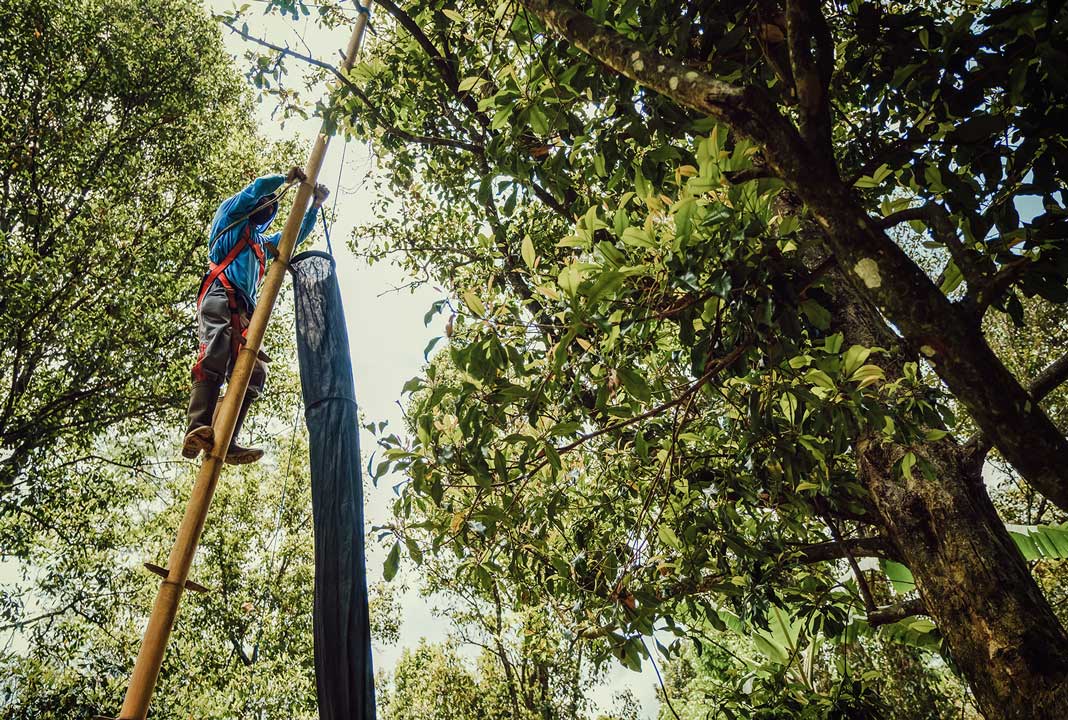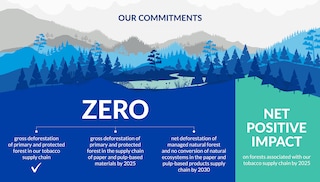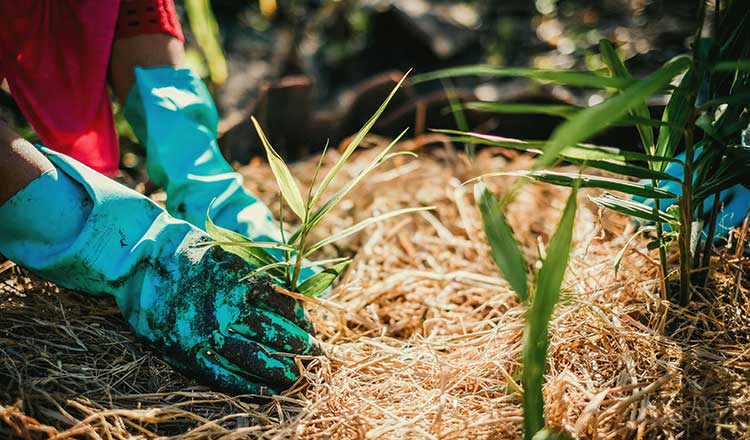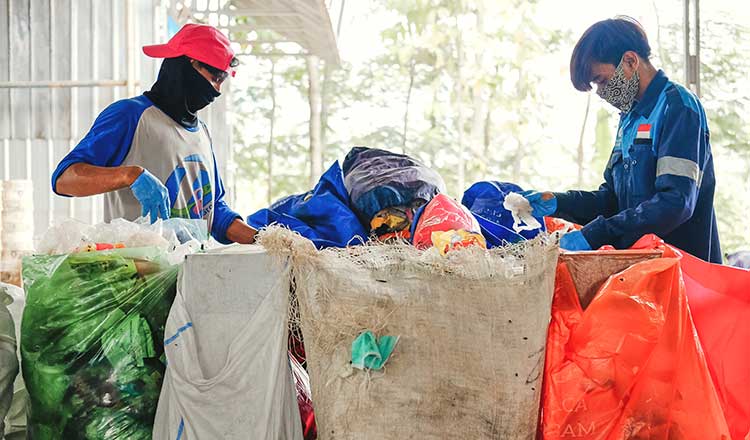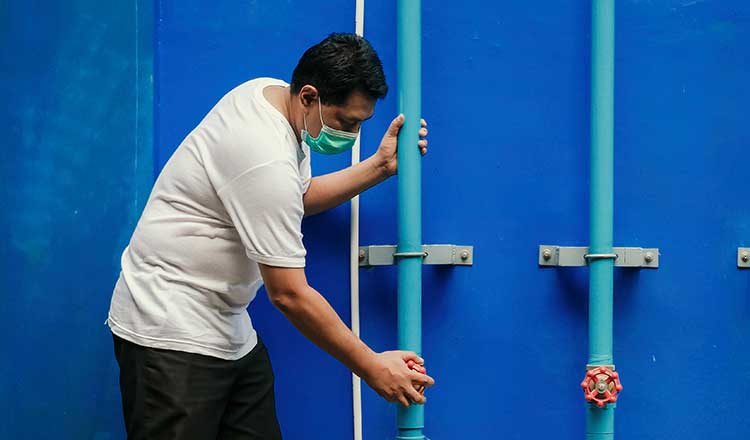| INTEGRATED REPORT 2020 |
The permanent removal of trees, driven primarily by agriculture, has a significant sustainability impact, negatively affecting the function of natural ecosystems, water cycle, climate, and biodiversity. Despite international initiatives, 10 million hectares of forest are lost, on average, each year. As human activities diminish biodiversity by cutting down forests and building more infrastructure, they increase the risk of pandemics such as COVID-19.
The right thing to do
The importance of forests cannot be overstated. From the air we breathe to the wood we use for home construction, we depend on forests for our very survival. Besides providing habitats for animals and livelihoods for humans, forests support fundamental processes such as watershed protection, carbon cycles, and soil preservation. They play a vital role in regulating climate conditions globally and locally and help to maintain rainfall patterns. Forests absorb carbon dioxide and foster the right conditions to preserve biodiversity. And, when they remain intact, they contribute to substantial economic value and increase resilience to disturbances and shocks.
Forest conservation is a tier 2 topic within our strategic pillar Protecting the environment.

Our progress in 2020
read more
Topic description
A significant portion of our environmental management efforts is devoted to protecting forests. To PMI, this means preventing deforestation linked to our operations and sourcing activities.
We take various actions to accomplish this, including seeking to use sustainable and traceable curing fuels in our tobacco supply chain, as well as responsibly sourcing paper and pulp-based products.
The business case
When managed appropriately, the natural capital of forests provides a sustainable source of raw materials for use in our products and operations. Our company activities are embedded within ecosystems, and that makes protecting forests and combatting their loss essential to PMI. We use wood fiber resources to a significant degree in our products and packaging, and we use firewood to cure tobacco. Moreover, tobacco farmers rely on forests as an essential element in the water cycle and for soil protection.
While there are risks to forests from land-use conversion within our highly complex and extensive supply chain, we consider it vital that our business does not generate deforestation, and we are pleased that our analysis shows that PMI’s actions are not conducive to deforestation risk. Land used for tobacco growing is decreasing year-on-year, and PMI is leveraging its scale to influence suppliers of packaging materials to source wood fiber sustainably.
Our aims
Our targets for our tobacco supply chain:
Zero gross
deforestation of primary and protected forests associated with the tobacco supply chain by 2020
Zero net
deforestation of managed natural forests in the tobacco supply chain by 2025
Net positive
impact on forests associated with the tobacco supply chain by 2025
Our targets relating to paper and pulp-based products:
Zero gross
deforestation of primary and protected forests associated with PMI’s paper, board, and pulp-based products supply chain by 2025
Zero net
deforestation of managed natural forests in PMI’s paper, board, and pulp-based products supply chains and no conversion of natural ecosystems by 2030
For definitions, please see PMI Zero Deforestation Manifesto.
Achieving our aims
We are committed to procuring wood-based materials from fully traceable and sustainable sources while protecting the rights and livelihoods of local communities. Our Zero Deforestation Manifesto and Commitments, introduced in 2019, further formalizes our commitment to work with suppliers of tobacco and paper and pulp-based products to ensure all sourcing is sustainable, traceable, and third-party verified. Knowing where wood and wood-based materials come from is vital to understanding the associated risks and to engaging with suppliers on targeted areas for improvement. However, complete traceability can be a challenge. For example, while most of our larger suppliers have established forest protection measures, smaller suppliers may not yet have such programs in place. Joining forces with our suppliers helps us address challenges and implement impactful programs.
To protect forests in our paper and pulp-based product supply chains, we base our due diligence on PMI’s Responsible Sourcing Principles, using a bespoke supplier platform. We have communicated these principles to all our global and regional suppliers of paper and pulp. This platform allows us to engage further with and assess suppliers, obtain primary data, and complete the PMI deforestation risk assessment.
The single largest cause of deforestation and forest degradation globally is commercial agriculture. The CDP Forests program provides us with a framework of action to measure and manage forest-related risks and opportunities, transparently report on progress, and commit to proactive action for the restoration of forests and ecosystems. We are dedicated to disclosing our efforts and progress transparently and are committed to completing the CDP Forest program submission annually. In 2020, we are proud to have received a Triple-A rating from CDP, which includes an A rating on CDP Forest.
To accelerate progress against our targets in the tobacco supply chain, we conduct global deforestation risk assessments annually to prioritize and adjust our actions. On the ground, we rely on field technicians to communicate our management approach to farmers.
We also rely on our Good Agricultural Practices (GAP) program, established in 2002 and updated periodically, to protect forests in our supply chain. GAP guidance regarding the sourcing of sustainable wood fuel for producing flue-cured Virginia tobacco helps farmers avoid contributing to the deforestation of old-growth forest (protected and primary forest) by being self-sufficient or using a sustainable alternative source of fuel. PMI’s Monitoring and Verification Framework for Sustainable Curing Fuels is applied across the company’s flue-cured tobacco supply chain. For Burley tobacco, the risk of deforestation relates to the wood used to build barns for air-curing. This risk is mainly present in Malawi and Mozambique. Engagement with suppliers and farmers is crucial, and, under the GAP program, we aim to improve the lifespan of all types of barns and switch them to sustainable sources of timber.
Ecosystem regeneration is important to offset the risk of deforestation, so we are working with tobacco suppliers and farmers to restore forests, going beyond the sustainable sourcing of wood fuel to deliver a net positive impact by 2025.

Our progress in 2020
read more
Performance metrics
view dataThis online content about our Integrated Report should be read in conjunction with PMI’s 2020 Integrated Report. The information and data presented here cover the 2020 calendar year or reflect status at December 31, 2020, worldwide, unless otherwise indicated. Where not specified, data come from PMI estimates. Please also refer to 'About this report' on page 3 of the 2020 Integrated Report for more information. Aspirational targets and goals do not constitute financial projections, and achievement of future results is subject to risks, uncertainties and inaccurate assumptions, as outlined in our forward-looking and cautionary statements on page 145. In the 2020 Integrated Report and in related communications, the terms “materiality,” “material,” and similar terms, when used in the context of economic, environmental, and social topics, are defined in the referenced sustainability standards and are not meant to correspond to the concept of materiality under the U.S. securities laws and/or disclosures required by the U.S. Securities and Exchange Commission.
